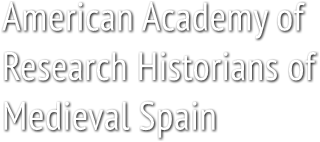RACE & GENDER IN THE GLOBAL MIDDLE AGES: A WORKING GROUP
https://scholarblogs.emory.edu/raceandgenderglobalmiddleages/
Fall 2023 Schedule
Friday, August 18 at 12pm EST
Dr. Mohamad Ballan, Assistant Professor of History
Stonybrook University
A Discussion of his recent Speculum article “Borderland Anxieties: Lisān al-Dīn ibn al-Khatị̄b (d. 1374) and the Politics of Genealogy in Late Medieval Granada.”
Abstract: This article seeks to contribute to larger scholarly conversations about the construction and deployment of difference in medieval borderland societies. It examines the ways in which genealogical notions of “Arabness” [ʿurūbiyyah], which expressed Islamic identity in terms of Arab lineage, structured the process of identity formation in Nasrid Granada (1232–1492). Through a close reading of the works of the Nasrid scholar-statesman Lisān al-Dīn ibn al-Khatị̄b (d. 1374) and his intellectual-political network, the article explores how Nasrid elites incorporated “Arabness” into the articulation of a local identity rooted in ethnic cohesion, religious exclusivity, and genealogical continuity. It argues that this constituted a particular strategy of identification that sought to differentiate Nasrid Granada from its neighbors and demarcate the boundaries between al-Andalus, Christian Iberia, and the Maghrib, even as these regions came to be tied even more closely together through political, intellectual, social, and mercantile networks between the thirteenth and fifteenth centuries. The article concludes with a consideration of the “racialization of religion” and the manner in which Ibn al-Khatị̄b integrated ideas about environmental determinism and physiognomy, alongside genealogy, to represent the religious and cultural traits of the inhabitants of Granada as fixed, immutable, and heritable characteristics, the product of both lineage and environment. Through an examination of the racialized production of difference within the dynamic borderland context of late medieval Iberia, this article seeks to invite broader comparative approaches that integrate the medieval Islamic world into discussions about race, racialization, and ethnicity in the Middle Ages.
Friday, September 22 at 12pm EST
Craig Perry, Assistant Professor of Middle Eastern Studies and Jewish Studies
Emory University
"Everyday Human Trafficking: Hemispheric Reach, Local Intensity"
Abstract: This chapter mines the geniza corpus to make two arguments about the medieval slave trade. First, the trade in slaves was decentralized: individual buyers organized the transregional trafficking of individuals as one part of a larger mixed cargo of commodities, and traded within their own personal mercantile and family networks. I contend that this decentralized trade was a primary method of human trafficking that historians have overlooked. A medieval Middle Passage never existed; rather, epochal warfare and famine caused temporary pulses in the supply of slaves. Second, the center of gravity of the slave trade in Egypt was local, not transregional. Geniza and other contemporaneous sources show that many enslaved people changed owners several times during their lives and that sale was only one method by which Jews transferred enslaved property. Wedding dowries, gifts, and bequests were primary methods that households used to transfer enslaved people as both laborers and inter-generational wealth. Two additional claims emerge from these arguments. Though the slave trade to Egypt was transregional and included enslaved people from as far afield as India and Byzantium, the most intensively exploited regions for slave imports were Nubia and greater northeast Africa. A close reading of geniza documents alongside rabbinic writings also demonstrates the contingencies and ambiguities of racialization in the Middle Ages. All non-Muslim people outside Islamic territories were legally enslaveable. But Jewish sources reveal how Egyptians began to code “Black”-skinned people as “slaves” in their epistolary exchanges even though “Black” was not yet used as one of the many long-standing ethnic categories that scribes were required to note in bills of sale, such as Nubian, Byzantine, Indian, and Abyssinian.
Friday, October 20 at 12pm EST
Felege-Selam Solomon Yirga, Assistant Professor of History
University of Tennessee, Knoxville
"A Roman in Islamic Egypt: Memory and Identity in the Chronicle of John of Nikiu"
The Chronicle of John of Nikiu, written in Coptic in the 7th century but surviving only in the form of a 17th-century Ge’ez translation of an Arabic intermediary, is often treated as an expression of an Egyptian identity rooted in miaphysite Christianity and some degree of antipathy towards and alienation from the Roman state. These readings are informed by a preconceived notion that there was a great degree of continuity between the Coptic church of the Early Islamic period and the Alexandrian church of the Roman empire, and a tacit belief that the Council of Chalcedon created an ideological rift between Alexandria and Constantinople. In this chapter, which will appear in my forthcoming book on the Chronicle, I argue that John of Nikiu’s text in fact reveals a historian who seemed to conceive of the historical Egypt as a core territory of the Roman empire by virtue of the province’s role in Christian history. Furthermore, he seems to view himself, and the Christians of Egypt, as in some way inextricably linked, even tacitly hinting that, should the government and church in Constantinople adopt an anti-Chalcedonian position, the Arab invasion of Egypt could be undone. The implication of this conclusion not only effects our understanding of the emergence of a distinct Coptic identity, but also challenges teleological notions of the inevitability of the long-term presence of Islamic hegemony over formerly Roman lands, which often pervade Islamic narrative sources, and which tend to inform modern scholarship on the subject.
Friday, November 17 at 12pm EST
Stacey Murrell, Ph.D. Candidate
Brown University
“Birthing Dynasties: Concubinage, Status, and Race in the Western Islamicate World, c.700-1000 CE.”
Friday, December 8 at 12pm EST
Denva Gallant, Assistant Professor of Art History
Rice University
“The Black Body as Site of Conversion: Race and Ethnicity in Late Medieval Italy."
